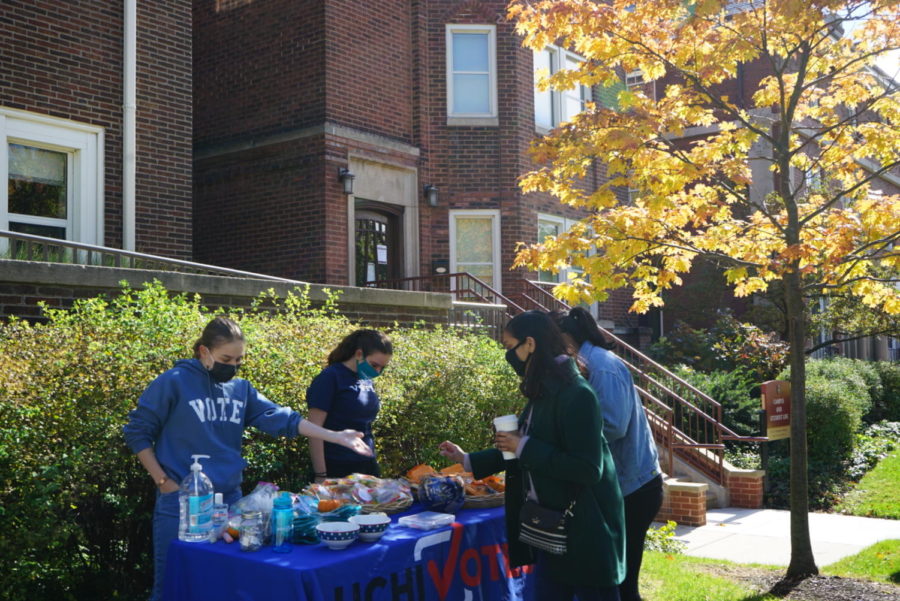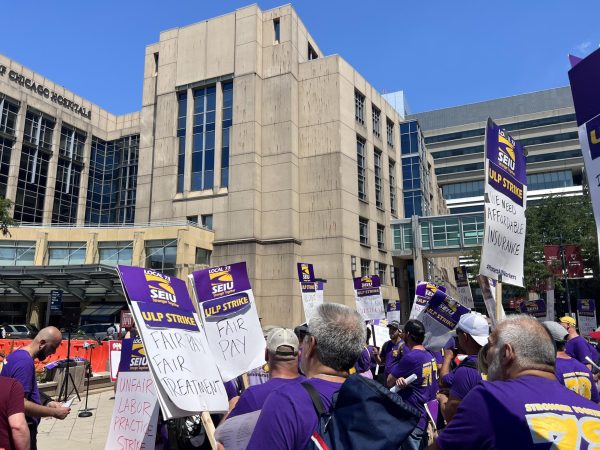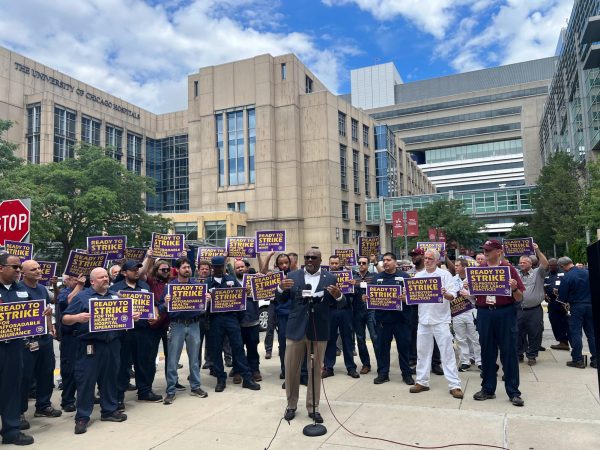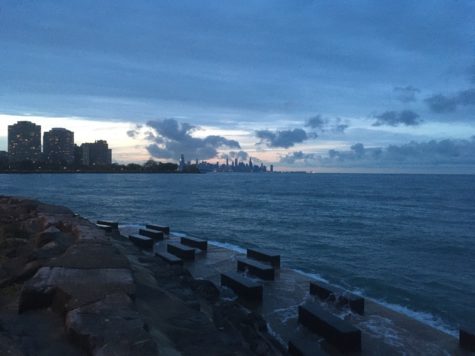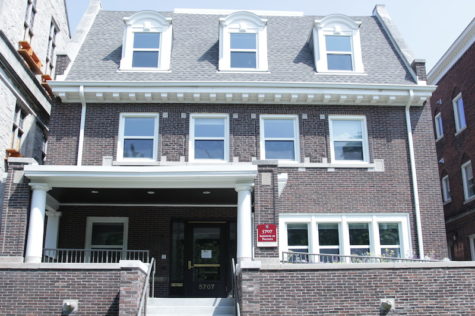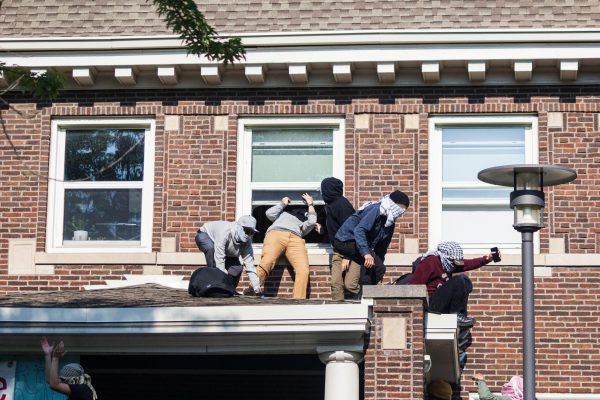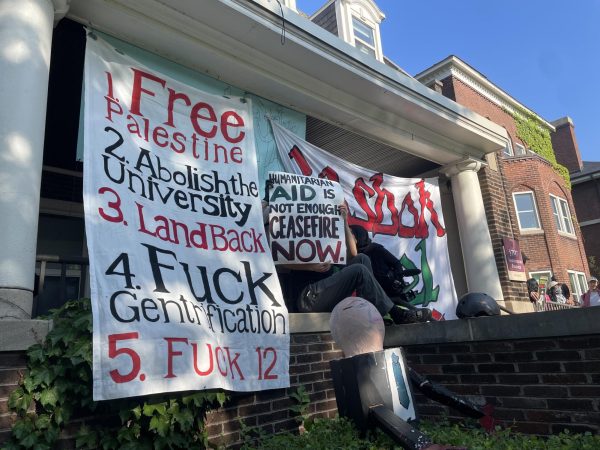Here’s What You Need to Know About the 2022 Midterm Races in Illinois
Voters will decide who serves as governor and in Congress, as well as on the future of labor rights in Illinois.
October 26, 2022
On November 8, voters in Illinois will decide who will represent them in government over the next few years. Voters will also decide on a ballot measure that could determine the future of labor organizing in the state. Here is a summary of the major candidates running to represent Hyde Park and of the Workers’ Rights Amendment.
Governor
The governor’s race pits incumbent Democrat J. B. Pritzker against Illinois Senator Darren Bailey. Recent polling suggests Pritzker enjoys a significant lead over Bailey. Despite the seemingly uncompetitive nature of the race, both sides have spent significant amounts of money.
Pritzker is a billionaire businessman and a member of the family that owns the Chicago-based Hyatt Hotels Corporation. In 1998, Pritzker ran for the House of Representatives in Illinois’s Ninth Congressional District but finished third. He later served as the national co-chair of Hillary Clinton’s 2008 presidential campaign. According to the Chicago Tribune, Pritzker has spent $152 million on his own campaign since winning the governor’s office in 2018. Forbes estimates Pritzker’s net worth at $3.6 billion.
Bailey is the owner of Bailey Family Farm in Xenia, Illinois. In 2018, Bailey won a seat in the Illinois House of Representatives for the 109th District before moving to the Illinois Senate in 2020. He easily won a six-person Republican primary with 57 percent of the vote. Bailey has raised almost $14 million during his candidacy, including $10 million from billionaire Richard Uihlein.
Pritzker’s campaign has largely focused on raising awareness of his first-term record. During a recent debate, Pritzker listed providing $1.8 billion in tax relief, raising the minimum wage, legalizing cannabis, and passing a major state infrastructure bill as some of his accomplishments.
Pritzker has recently increased his focus on attacking Bailey’s position on abortion. In a 2017 video posted on Bailey’s Facebook page, Bailey compared abortion to the Holocaust.
“The attempted extermination of the Jews of World War II doesn’t even compare to a shadow of the life that has been lost with abortion since its legalization,” Bailey said.
Bailey has spent the closing months of the campaign attacking Pritzker over crime, taxes, and education. Bailey supports repealing the recently passed SAFE-T Act, which abolished cash bail for several criminal offenses, including second-degree murder and aggravated battery.
Senate
At the federal level, incumbent Democratic senator Tammy Duckworth faces a challenge from Republican Kathy Salvi. Election experts, including the non-partisan Cook Political Report and UVA Center for Politics, expect Duckworth to be reelected comfortably. The most recent publicly available poll, conducted by Emerson College, showed Duckworth with a 19 percent margin of victory.
Duckworth is a U.S. Army veteran and Purple Heart recipient who served as a Black Hawk helicopter pilot during the Iraq War, in which she lost both legs when her helicopter was attacked by a rocket-propelled grenade in 2004. After leaving the Army, she became the director of the Illinois Department of Veterans Affairs and then the assistant secretary of the Department of Veterans Affairs during the Obama administration. Duckworth was then elected to the House of Representatives in 2012, serving for two terms before unseating Republican senator Mark Kirk in 2016.
Salvi is an attorney who served as a law clerk in Illinois’ Second Appellate District and as an assistant public defender in Lake County. She then entered private law practice as a personal injury lawyer. In 2006, Salvi ran for the Republican nomination for Illinois’s Eighth Congressional District but lost in the primary. Salvi defeated a seven-candidate field in the Republican primary to win the nomination with 30 percent of the vote.
In her reelection campaign, Duckworth has touted the passage of recent bills including the Inflation Reduction Act and the Bipartisan Infrastructure Law.
Duckworth has criticized Salvi’s position on abortion. Salvi supported the Supreme Court’s decision overturning the constitutional right to an abortion and said in a recent debate that the issue of abortion access should be made at the state level.
In the same debate, Salvi attempted to characterize Duckworth as a “rubber stamp” for President Biden’s “socialist, leftist agenda.” Salvi has also focused on tying Duckworth to inflation and crime, which recent polling suggests are two of the most important issues for Illinois voters. According to Salvi’s website, she prioritizes increasing domestic energy production, limiting federal spending, securing the southern border, and expanding police resources.
House of Representatives
Representative Bobby Rush’s announcement that he would retire after nearly 30 years in Congress created a rare open seat in Illinois’s First Congressional District, which covers almost all of Hyde Park.
The Republican nominee is Eric Carlson, who won the Republican primary by fewer than 400 votes. The Democratic primary featured 17 candidates hoping to replace Rush. Jonathan Jackson received 28 percent of the primary vote and will face Carlson in the general election. Cook Political Report finds that the district favors Democrats by 20 percent.
Jackson is the son of civil rights leader Rev. Jesse Jackson Sr. and activist Jacqueline Jackson. After graduating from business school, Jackson worked as an investment analyst before starting several of his own businesses. Jackson is running on a progressive platform, supporting Medicare for All, the Green New Deal, and stricter gun laws. He has been endorsed by a number of high-profile politicians and organizations, including Senator Bernie Sanders, Representative Jesús “Chuy” García, and the Chicago Teachers Union.
Carlson was sentenced to 12 years in prison for sexually assaulting a woman in 1995. He was released after spending only six years behind bars. Per his website, Carlson’s top political priorities include fighting crime and lowering inflation. His most recent financial disclosure shows he has spent less than $5,000 on his campaign.
Amendment 1
Illinois voters will also determine whether the Illinois Constitution should be amended to guarantee employees the right to organize and to collective bargaining. If adopted, Amendment 1, also known as the Workers’ Rights Amendment, would prohibit the Illinois legislature from passing legislation that interferes with the rights of employees to form unions.
Proponents of the measure, primarily union leaders and Democratic politicians, argue that the law will strengthen unions’ ability to bargain for better working conditions. The law would also bar the legislature from passing right-to-work laws, which prevent unions and companies from requiring employees to join the union when hired.
“Corporations are much more powerful than an individual worker who wants to go in and bargain for their own wages,” Pritzker said in the gubernatorial debate. “Workers ought to be able to get together and go in together to try to get a better wage, a safer workplace, and benefits. That’s what we’re trying to guarantee.”
Opponents of the amendment claim it interferes with an individual’s ability to choose whether to join a union and decreases the government’s control over public services, such as schools.
“There’s no limit on what government leaders can be forced to give away because of the powerful strikes that we will see,” Mailee Smith, director of labor policy at the libertarian Illinois Policy Institute, told WBEZ. “It’s going to drive up the cost of government, and who’s going to be forced to pay for that? That’s the taxpayers.”


